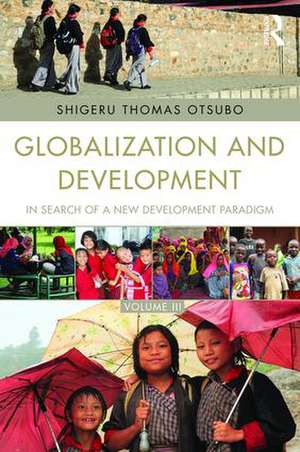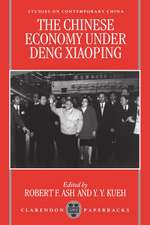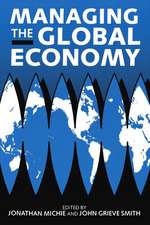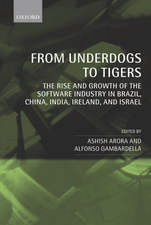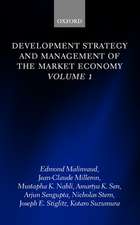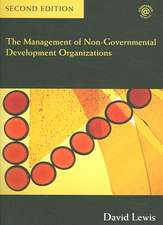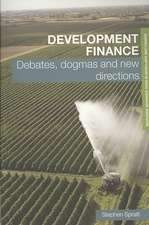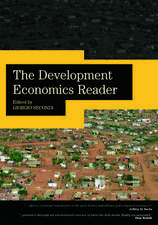Globalization and Development Volume III: In search of a new development paradigm
Editat de Shigeru Thomas Otsuboen Limba Engleză Paperback – oct 2015
Volume III (Part IV) presents the diversified development paradigms such as the GNH (Bhutan), the sufficiency economy (Thailand), the reform and opening up paradigm (China), the African and Latin American paradigms, and the Islamic development paradigm. The Concluding Chapter presents the evolution of development paradigms in the global development cooperation community after World War II, and then offers a glimpse into new development paradigms for the post-MDG era.
This book intends to serve as a unique and comprehensive guide for those in the international development community on the subjects of diversified development paradigms/paths under globalization and other challenges in the post-MDG era.
| Toate formatele și edițiile | Preț | Express |
|---|---|---|
| Paperback (1) | 466.77 lei 6-8 săpt. | |
| Taylor & Francis – oct 2015 | 466.77 lei 6-8 săpt. | |
| Hardback (1) | 1115.33 lei 6-8 săpt. | |
| Taylor & Francis – 21 sep 2015 | 1115.33 lei 6-8 săpt. |
Preț: 466.77 lei
Preț vechi: 549.14 lei
-15% Nou
Puncte Express: 700
Preț estimativ în valută:
89.33€ • 92.92$ • 73.75£
89.33€ • 92.92$ • 73.75£
Carte tipărită la comandă
Livrare economică 15-29 aprilie
Preluare comenzi: 021 569.72.76
Specificații
ISBN-13: 9781138932272
ISBN-10: 1138932272
Pagini: 326
Ilustrații: 26 black & white illustrations, 30 black & white tables
Dimensiuni: 156 x 234 x 30 mm
Greutate: 0.61 kg
Ediția:1
Editura: Taylor & Francis
Colecția Routledge
Locul publicării:Oxford, United Kingdom
ISBN-10: 1138932272
Pagini: 326
Ilustrații: 26 black & white illustrations, 30 black & white tables
Dimensiuni: 156 x 234 x 30 mm
Greutate: 0.61 kg
Ediția:1
Editura: Taylor & Francis
Colecția Routledge
Locul publicării:Oxford, United Kingdom
Public țintă
Postgraduate and UndergraduateCuprins
Part 4: New Development Paradigms under Globalization 21. Balancing GDP with GNH 22. Thailand: Sufficiency Economy, Green and Happy Society 23. The Current Situation and Future Challenges of China’s Economy 24. Measurements and Determinants of Multifaceted Poverty: Absolute, Relative, and Subjective Poverty in Indonesia 25. Decentralization in Indonesia: An Empirical Analysis of District and City Performance 26. Divergent and Unequal Development in Latin America: Causes and Policy Challenges 27. Islamic Finance: An Alternative Paradigm in Development Finance 28. Determinants of Incidence and Depth of Poverty in Ghana: Does Development Benefit the Extreme Poor? 29. Africa’s Quest Beyond Colonial Development Paradigms: Indigenous Technological Development Concluding Chapter 30. In Search of a New Development Paradigm: Retrospect and Prospect
Recenzii
'Globalization and Development – In Search of a New Development Paradigm is an excellent and comprehensive work on International Development. It is a welcome and significant contribution to understanding globalization, its determinants and impacts on development including growth, poverty and inequality. Written by well-known academics and scholars from various parts of the world, it provides a comparative and multidimensional analysis which is relevant in today’s dynamic and more interconnected global economy.' —Teofilo C. Daquila, Associate Professor of Southeast Asian Economics, National University of Singapore
‘This set is a useful reference reading to policymakers, research fellows and academics on globalisation and economic development in South-East Asia and Africa. The subject is so vast that it would not be just to remark only what it does not cover (there are important missing matters such as the emerging Trans Pacific Partnership; or profound considerations of Singapore and South Korea), but rather what it does: the set is a useful collection of articles on select national experiences regarding development in a changing globalised world. As such, students may find in this set a useful reading material for their courses. In addition, the set is a highly recommended item for the libraries and shelves for those that deal with development, income distribution and globalisation.’— Miroslav N. Jovanović, Global Studies Institute, University of Geneva, extracted from the Journal of Economic Integration
‘This set is a useful reference reading to policymakers, research fellows and academics on globalisation and economic development in South-East Asia and Africa. The subject is so vast that it would not be just to remark only what it does not cover (there are important missing matters such as the emerging Trans Pacific Partnership; or profound considerations of Singapore and South Korea), but rather what it does: the set is a useful collection of articles on select national experiences regarding development in a changing globalised world. As such, students may find in this set a useful reading material for their courses. In addition, the set is a highly recommended item for the libraries and shelves for those that deal with development, income distribution and globalisation.’– Miroslav N. Jovanović, Global Studies Institute, University of Geneva, extracted from the Journal of Economic Integration
‘This set is a useful reference reading to policymakers, research fellows and academics on globalisation and economic development in South-East Asia and Africa. The subject is so vast that it would not be just to remark only what it does not cover (there are important missing matters such as the emerging Trans Pacific Partnership; or profound considerations of Singapore and South Korea), but rather what it does: the set is a useful collection of articles on select national experiences regarding development in a changing globalised world. As such, students may find in this set a useful reading material for their courses. In addition, the set is a highly recommended item for the libraries and shelves for those that deal with development, income distribution and globalisation.’— Miroslav N. Jovanović, Global Studies Institute, University of Geneva, extracted from the Journal of Economic Integration
‘This set is a useful reference reading to policymakers, research fellows and academics on globalisation and economic development in South-East Asia and Africa. The subject is so vast that it would not be just to remark only what it does not cover (there are important missing matters such as the emerging Trans Pacific Partnership; or profound considerations of Singapore and South Korea), but rather what it does: the set is a useful collection of articles on select national experiences regarding development in a changing globalised world. As such, students may find in this set a useful reading material for their courses. In addition, the set is a highly recommended item for the libraries and shelves for those that deal with development, income distribution and globalisation.’– Miroslav N. Jovanović, Global Studies Institute, University of Geneva, extracted from the Journal of Economic Integration
Descriere
Globalization and Development is a "cross-national study" on the "interstate dispersion" of the impacts (to growth, inequality and poverty) that international economic integration provides to the economies of the developing countries.
Volume III (Part IV) presents the diversified development paradigms such as the GNH (Bhutan), the Sufficiency Economy (Thailand), the Reform and Opening Up (China), the African and Latin American paradigms, and the Islamic development paradigm. The Concluding Chapter presents the evolution of development paradigms in the global development cooperation community after WWII, and then offers a glimpse into new development paradigms for the post-MDGs era.
Volume III (Part IV) presents the diversified development paradigms such as the GNH (Bhutan), the Sufficiency Economy (Thailand), the Reform and Opening Up (China), the African and Latin American paradigms, and the Islamic development paradigm. The Concluding Chapter presents the evolution of development paradigms in the global development cooperation community after WWII, and then offers a glimpse into new development paradigms for the post-MDGs era.
